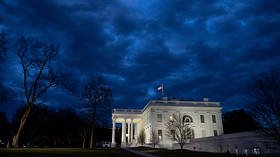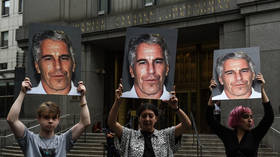Inconvenient truths: Alarming things we have learned under Trump, but not always about him

Almost daily for three years, Democrats and their media have told us very bad things about Donald Trump’s life, character, and presidency. Some of them are true.
But in the process, we have also learned some lamentable, even alarming, things about the Democratic Party establishment, including self-professed liberals. Consider the following:
— The Democratic establishment is deeply and widely imbued with rancid Russophobic attitudes. Most telling was (and remains) a core “Russiagate” allegation that “Russia attacked American democracy during the 2016 presidential election” on Trump's behalf—an “attack” so nefarious it has often been equated with Pearl Harbor. But there was no “attack” in 2016, only, as I have previously explained, ritualistic “meddling” of the kind that both Russia and America have undertaken in the other’s elections for decades. Little can be more phobic than the allegation or belief that one has been “attacked by a hostile” entity. And yet, this myth and its false narrative persist in the Democratic Party’s discourse, campaigning, and fund-raising.
Also on rt.com Russiagate is a cult, complete with unquestionable doctrine, dissent-shaming, and us-vs-them cosmology— We have also learned that the heads of America’s intelligence agencies under President Obama, especially John Brennan of the CIA and James Clapper, Director of National Intelligence, felt themselves entitled to try to undermine an American presidential candidacy and subsequent presidency, that of Donald Trump. Early on, I termed this operation “Intelgate,” and it has since been well documented by other writers, including Lee Smith in his new book. Intel officials did so in tacit alliance with certain leading, and equally Russophobic, members of the Democratic Party, which had once opposed such transgressions. This may be the most alarming revelation of the Trump years: Trump will leave power, but these self-aggrandizing intelligence agencies will remain.
— We also learned that, contrary to democratic dogma, the mainstream “free press” cannot be fully trusted to readily expose such abuses of power. Indeed, what the mainstream media—leading national newspapers and two cable news networks, in particular—chose to cover and report, and chose not to cover and report, made the abuses and consequences of Russiagate allegations possible. Even now, exceedingly influential publications such as The New York Times seem eager to delegitimize the investigation by Attorney General William Barr and his appointed special investigator John Durham into the origins of Russiagate. Barr’s critics accuse him of fabricating a “conspiracy theory” on behalf of Trump. But the real, or grandest, conspiracy theory was the Russiagate allegation of “collusion” between Trump and the Kremlin, an accusation that was—or should have been—discredited by the Robert Mueller report.— And we have learned, or should have learned, that for all the talk by Democrats about Trump as a danger to US national security, it is their Russiagate allegations that truly endanger it.
Also on rt.com Is collusion still a thing? Washington Post publishing ‘illustrated Mueller report’ bookConsider two examples. Russia’s new “hyper-sonic” missiles, which can elude US missile-defense systems, make new nuclear arms negotiations with Moscow imperative and urgent. If only for the sake of his legacy, Trump is likely to want to do so. But even if he is able to, will Trump be entrusted enough to conduct negotiations as successfully as did his predecessors in the White House, given the “Putin puppet” and “Kremlin stooge” accusations still being directed at him?
Similarly, as I have asked repeatedly, if confronted with a US-Russian Cuban Missile–like crisis—anywhere Washington and Moscow are currently eyeball-to-eyeball militarily, from the Baltic region and Ukraine to Syria—will Trump be as free politically as was President John F. Kennedy to resolve it without war? Here too there is an inconvenient truth: to the extent that Democrats any longer seriously discuss national security in the context of US-Russian relations, it mostly involves vilifying both Trump and Russian leader Vladimir Putin. (Recall also that previous presidents were free to negotiate with Russia’s Soviet communist leaders, even encouraged to do so, whereas the demonized Putin is an anti-communist, post-Soviet leader.)
The current state of US-Russian relations is unprecedentedly dangerous, not only due to reasons cited here—a new cold war fraught with the possibility of hot war. Whether President Trump serves one or two terms, he must be fully empowered to cope with the multiple possibilities of a US-Russian military confrontation. That requires ridding him and our nation of Russiagate allegations—and that in turn requires learning how such allegations originated.
Also on rt.com DOJ opens criminal probe into 'Russiagate' investigation after administrative review – reportOpponents of Barr’s investigation into the origins of Russiagate say it is impermissible or unprecedented to “investigate the investigators.” But the bipartisan Church Committee, based in the US Senate, did so in the mid-1970s. It exposed many abuses by US intelligence agencies, particularly by the CIA, and adopted remedies that it believed would be permanent. Clearly, they have not been.
However well-intended Barr may be, he is Trump’s Attorney General and therefore not fully credible. As I have also argued repeatedly, a new Church Committee is urgently needed. It’s time for honorable members of the Senate of both parties to do their duty.
By Stephen F. Cohen
This article was originally published by The Nation.
Stephen F. Cohen is a professor emeritus of Russian studies, history, and politics at New York University and Princeton University. A Nation contributing editor, he is the author, most recently, of War With Russia? From Putin & Ukraine to Trump & Russiagate and Soviet Fates and Lost Alternatives: From Stalinism to the New Cold War.
Think your friends would be interested? Share this story!
The statements, views and opinions expressed in this column are solely those of the author and do not necessarily represent those of RT.














